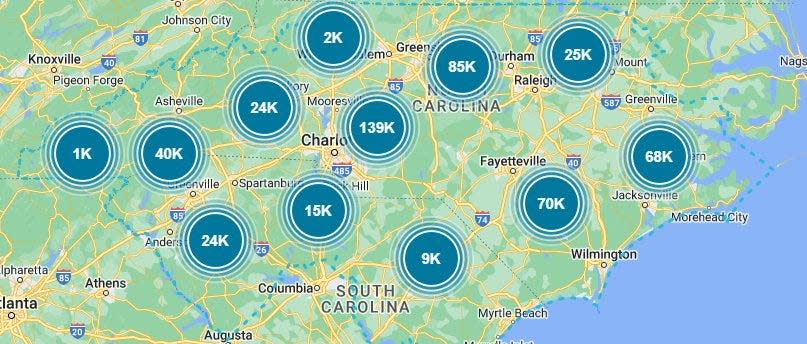Duke Energy December blackouts a red alert that NC must have reliable power
Every business in North Carolina, like almost every home, requires energy to run — in the case of busy restaurants like mine, quite a bit of it. Besides that, what every business needs most is predictability and reliability, whether in tax and regulatory policy or workforce talent.
That’s why Duke Energy’s notorious Christmas Eve blackouts, which left half a million homes and businesses in the dark, were not just a black eye for the state — they were a red alert for thousands of energy-dependent businesses like ours.
North Carolina offers an attractive tax environment, reasonable regulations, a pleasant climate and solid public education from K-12 to community colleges and universities. These assets have helped the state grow and attract private investment from Asheville to Jacksonville, where I live.

But without market reforms that lead to a more reliable and resilient power supply, North Carolina could quickly fall behind competitor states all around it, and beyond.
It is therefore in North Carolina’s economic, social, and political interests to embrace energy market reforms of the kind under consideration in neighboring South Carolina and already in place elsewhere.
Competition and choice
For starters, North Carolina needs more competition in its energy market. Competition and choice always benefit consumers. Our industry thrives amid competition, which puts a premium on customer service and product value. There’s no reason why the energy sector couldn’t, too.
Competition also incentivizes innovation, part of the genius of free markets. Monopolies, by contrast, have little reason to improve their products or their customer service. Why should they?
More: Pitts: As Moore Co. power grid attacks go viral on YouTube, NC hunts solutions
Advances in certain kinds of energy production do not preclude the use of others. The more diverse North Carolina’s array of power sources, the better. When some aren’t working, such as Duke Energy’s coal and natural gas plant failures during the December blackouts, others can help pick up the slack.

Regardless of the power sources, energy storage is becoming more and more important. In a business like ours — or any household budget — savings cushion the blows from fluctuations in revenue. The same is true of the electricity we depend on in our daily lives, as well as for critical life-support services. The more of an asset we bank, the more we can tap when supplies dip.
An idea that makes sense to companies like mine is greater regional connectivity and cooperation among power utilities, as a recent study of South Carolina’s energy market recommended. In fact, that study suggested that South Carolina and North Carolina pursue upgrades in tandem. Entrepreneurs who operate in more than one state wonder why our power grids don’t, too.
Consumer savings
A consultant estimated several years ago that energy market reform in North Carolina would save consumers here as much as $600 million a year. If that were a tax cut, it likely would be a top priority in the North Carolina General Assembly. From the standpoint of the state’s consumers, more money in their pockets is welcome no matter the source.
In this case, the savings would come without any reduction in services. In fact, regional grid interconnection tends to lower consumer costs while improving energy resilience and reliability — something we all could have used during Duke’s December blackouts.
The 2019 report recommended a more comprehensive study of potential energy market reforms in North Carolina, which makes sense to companies like mine across the state, in big cities and small towns alike. That’s why we support recent legislation that would fund just such a study.
North Carolina did not get where it is today by sticking with the old ways of doing things. The state that was first in freedom and first in flight boasts a proud heritage of innovation, industrial investment, and entrepreneurial drive, all for the good of its people.
Competition, choice, savings and reliability generate success in any human endeavor. For North Carolina’s 11 million citizens and its hundreds of thousands of businesses, nowhere is that more vital than in the energy supply we all depend on each moment of every day and night.
If North Carolina’s lawmakers can make life markedly better and safer for workers, employers, retirees, and families across the state, they should — before the next blackout hits.
Billy Sewell is President and CEO of Platinum Corral, which owns and operates 12 Golden Corral restaurants in North Carolina and Virginia. He is a former Jacksonville Onslow Chamber of Commerce Man of the Year.
This article originally appeared on The Fayetteville Observer: Duke Energy Christmas Eve blackouts a NC red alert: Reliable power a must

